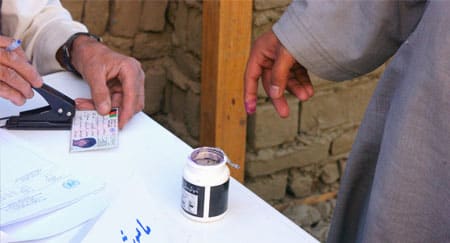While there are many players in the forthcoming elections - including national, foreign and tribal - it could be the single issue of security which takes centre stage, argues Professor Wadir Safi of Kabul University.
Back in 1964, Afghanistan finally got a constitution. It guaranteed peoples’ rights, but merely on paper. In its decade of democracy, Afghanistan was calm, and there was no threat to its independence, territorial integrity or sovereignty.
Despite this, parliamentary elections at the time were full of illegitimate interferences from above. Efforts were made to bring in the supporters of the King. This led to more interference by foreign countries. Finally, this opened the way for military coups and foreign aggression supporting specific regimes in Afghanistan.
What happened after that, in the last 30 years in Afghanistan, has resulted in more atrocities, loss of human resources, increasing illiteracy, economic dependence, an autocratic mentality and religious fundamentalism used for political ends.
Taking this into consideration the question arises: can the forthcoming elections be sure to be free and fair in the current security environment? The answer is obvious: no!
Our war-torn people live under the shadows of corruption and government bribery. This has resulted in dissatisfaction, mistrust and hopelessness of Afghans in general.
Why? First, because only in a secure environment can people feel free and think comfortably and express their ideas independently. These conditions are not yet met in most of Afghanistan’s territory or population.
This is obvious from the developments in security, economics, general reconstruction in society, justice and the rule of law. Our war-torn people live under the shadows of corruption and government bribery. This has resulted in dissatisfaction, mistrust and hopelessness of Afghans in general. This in turn, has caused increased insecurity and siding with the armed enemies of the regime.
Until these enemies are met and brought to negotiations, through military pressure or active diplomacy (or both), elections can’t be free and fair. Especially if these same enemies have declared their threats of attacks on those who take part in the coming elections. There are many previous practical examples showing they are capable of such acts.
Second, in Afghanistan today the real power in all 34 provinces is mostly in the hands of irresponsible gunmen owners who are linked to high ranking officials in the central government in Kabul. In other words, we see 34 pictures and copies of what we witness in Kabul. Those who oppose their orders or act independently are dead people. And no Commission or official judiciary is capable of bringing these criminals to justice.
This again causes insecurity in a society that has a weak administration. I believe that this forces some victims families to escape and enter the service of armed opposition. They become cheap religious or economic hostages, ready to commit any crime in reaction to what happens in his country. These victims not only do not take part in elections, but also want to disrupt others.
Third, no war-criminal or human rights violator has yet been brought to justice. Many are are well-known to the people of Afghanistan. Afghans are still living in a tribalism (and have for decades) because of the lack of an effective government. This was fueled by pro-Soviet regimes who divided people by ethnicity, language, geography, religion and politics – so that they obeyed more. Different Afghan ethnic groups were even given arms to use against each other.
So, no justice, no peace! The prevailing injustice in society means people are not secure and can’t trust the regime. This infringes free and fair elections in the country.
Even among the literate, the percentage of politically mature is at a minimum
Fourth, illiteracy. In Afghanistan, the percentage of literacy has always remained low. It has in fact decreased, especially after all the wars. The reasons include the increase of refugees and displacements. Learning to read and write is not helped in an environment which has widespread basic agricultural practices, no modern industry and wholesale economic insecurity. Living day to day is more important in a society that suffers from human trafficking, narcotics smuggling mafia and people submitting to the political and religious wills of others for money. Even among the literate, the percentage of politically mature is at a minimum.
Fifth, the presence of foreign troops is a factor, be it for security or fighting international terrorism. As the armed enemy of the regime and foreign forces fight continuously in Afghanistan, the insurgency starts living in the same homes as the rest of the population. This situation causes casualties more to the civilians than insurgents; if not physically, the majority is affected mentally and psychologically. This causes discontent and opposition to the regime. This, in turn, gives a helping hand to those foreign elements who want to continue the war in Afghanistan for their own national interests.
Sixth, this overt (or covert) interference in Afghanistan’s elections by neighbouring and other foreign countries hoping to influence the future government is even more dangerous for free and fair elections. Why? Because many of the power-addicted personalities rely more on money and guns from those external forces rather than respecting the real votes of their citizens.
In conclusion, let us not to destroy the image of a real democracy by applying it through a false and fake process. Afghanistan is taking its first steps towards elections. What’s needed is self-determination, with Afghans choosing the right socio-economic-political path for their own economic, social, cultural and historical-traditional prevailing conditions.
This is especially important in this post cold war era, where the whole world is encouraged to follow democratic paths, such as holding elections, as a route to future prosperity. This is what the Afghans, in our war torn country, thirst for and it is the only way out of all the evils here. So, security is a must for establishing a true democratically elected regime.



